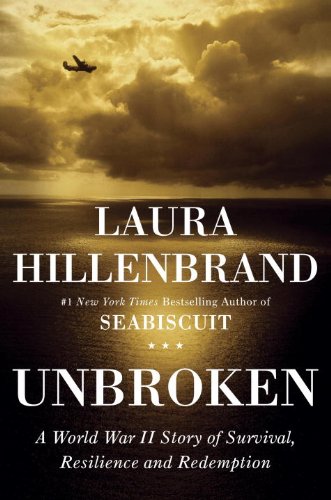
UNBROKEN by Laura Hillenbrand
This story has now rattled around and percolated in my brain for long enough to jot some final thoughts about Unbroken. There can be no doubt it was compellingly written, in a manner which drew me into the lives of these men as they suffered countless brutalities and indignities. I might have trouble commenting on the story, and the book, in any coherent way, so you have been warned.
In high school, I was assigned to interview someone about an interesting experience or characteristic about themselves, and I originally chose my grandfather, who had been stationed at Pearl Harbor during the attack. When I tried to start the conversation, he immediately became gruff and annoyed, barking "What do you want to know? The Japanese attacked us." End of story. Although Louie, the focus of the story's main narrative, was not at Pearl Harbor, after learning of all the chaotic suffering of the men in the war, I might have a slightly better understanding of why my grandfather refused to talk about his experience at Pearl Harbor. Talking about the experiences, for many, was akin to reliving them. Who on earth would want to do that. I do regret that I did not have the chance to approach the subject with him later, from a possibly more sensitive and nuanced point of view.
I find myself for some reason every so slightly unsatisfied with the conclusion of the book. As with any true story, wrapping it up after the bulk of the main story is over proves slightly awkward. Louie is indeed an inspiring character, and overcame a host of impossible atrocities. He did finally make it back home, and suffered tremendously from PTSD, about which very little was known at the time. His wife convinced him to come hear Billy Graham speak, and that's what shook him free of his alcoholic coping mechanism. He became a very devout Christian, which, due to my own experience growing up in the Bible Belt, I had to take with a grain of salt (explanation to be divulged at a later time). I cannot discount the dramatic importance of religion in providing meaning to people's lives, and I'm very glad he managed to find his way back to a functional, meaningful life. He did strike me as lacking the judgmental nature of so many die-hard Christians, and that was refreshing. He managed to forgive his main abuser at the camps, and to let go of his anger - for anyone, an outstanding feat.
I think what I find slightly hard to swallow is that Louie's finding of religion, rather than his triumph over the anger he felt, somehow becomes the main focus. I realize the two go hand in hand here -- that he found meaning and comfort in his chosen religion which was instrumental in helping him overcome his anger and lead a productive and full life. Still, it seemed that the emphasis was placed more strongly on that Louie "found God" rather than he overcame his demons, so to speak. I am probably judging that aspect of the end too harshly, and through too thick a personal lens. However, I believe such an ending could come off as slightly preachy to anyone that is not Christian. The author could have highlighted finding meaning in religion generally as well as specifically, perhaps, bringing it more in line with a general human experience to which almost anyone (except, perhaps, atheists) could relate. But, perhaps that's expecting way too much out of the telling of one man's specific experiences.
I would still, of course, highly recommend this book. I chose it originally because the subject matter is far out of my comfort zone, as well as not anything I typically choose to read. The writing is thoughtful and vivid, and I think I have a much better, although of course still hopelessly limited, understanding of the actual horrors people at war must endure. It's a wonder any of them can remain psychologically, let alone physically, whole. I was very sad to learn that Louie's injuries ultimately prevented him from running in the Olympics again. The war stole too much from him, although, at least, not his life or resilience.
